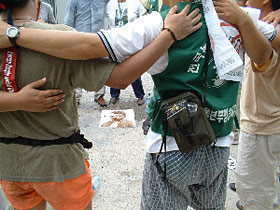 |
 |
 |
 News from Around the Americas | May 2005 News from Around the Americas | May 2005  
Koreans Mark Century In Mexico
 Wire services Wire services


| | Koreans sing and chant "ˇZapata vive! ˇLa lucha sigue!" ("Zapata lives! The struggle continues!" after Mexican revolutionary Emiliano Zapata) during protests at the Cancun WTO Ministerial in 2003. |
Mexicans of Korean descent, who have generally thrived here but still struggle to overcome stereotypes, began on Wednesday commemorations of their community's 100 years in Mexico.

"The first group, which arrived in Mexico without knowing the language or customs, stayed together for many years, but as time passed families spread out across the republic," Korean Association of Mexico (AMC) president David Kim Kong told EFE.

During the 1904-1905 Russian-Japanese War over control of the Korean peninsula and Manchuria, more than 1,000 Koreans arrived in Mexico aboard a British ship.

The Koreans' story is a moving one, with tales of escapes from Japanese expansionism at the beginning of the 20th century that eventually led to the occupation of the Korean peninsula and of the harsh working conditions under which the pioneers toiled on the sisal plantations of the southern Mexican state of Yucatan.

"My grandparents arrived on the first ship and I know they were very difficult years for Mexico as well as Korea, because the revolution was starting here and Korea was invaded by the Japanese, so those early immigrants could not return home," Kong said.

At that time, leaving the Asian nation resulted in a loss of nationality and links to families.

The government then in power in Korea did nothing to help or stay in touch with the emigrants, who had to start their lives all over again in Mexico and other countries in the Americas.

A century later, the descendants of those first families are fully Mexican, even if the majority try to preserve customs and traditions as much as possible.

Wednesday, the descendants started celebrating the fact that in Mexico, after much hardship, they found a second country.

"I've always believed that we are very fortunate because we live in two worlds, two cultures," Kong said.

"Nowadays, (South) Korea has a very important place in the world economy. And 100 years after the arrival of our first countrymen, it's a good time to strengthen links even more ... and celebrate that for a century the Samgyetang (ginseng chicken soup) and the tortilla have been served on the same table," Association of Koreans in Mexico president Gwanh Suck Lee told EFE.

Lee said that in 1905 little or nothing was known in Mexico about Korea, and many Mexicans thought the immigrants were from China or Japan.

"When (the first immigrants) completed their work contracts with the plantations, they had nowhere to go. It was hard for them, and I think they felt abandoned," Lee said.

"Although the situation has changed, the tendency now is to link Koreans to organized crime, not only in Mexico but in many countries, due to the image of us portrayed in (U.S.) films," Lee said.

At events to be held in coming days and attended by high-level officials from Seoul, the emphasis will be on countering stereotypes by showing that Koreans "are good people and hard workers."

"Despite our cultural differences, we feel great empathy in my country with Mexico. (However,) I understand that for many years the descendants of Koreans were forgotten by their own homeland," Lee said.

The centennial events were organized by Korean organizations in Mexico City and local officials.

Conferences on Korean immigration, food festivals, crafts fairs, concerts and, on May 7, a parade, are among the events planned.

On May 8, a ceremony will take place at the Zocalo, main plaza, with guests of honor from the South Korean government and exhibitions of traditional costumes, martial arts and fireworks displays. | 
 | |
 |



